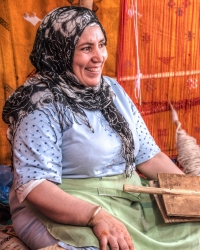Berber, Tamazight in France

Photo Source:
Marco Vangelisti
Creative Commons
|
Send Joshua Project a map of this people group.
|
| People Name: | Berber, Tamazight |
| Country: | France |
| 10/40 Window: | No |
| Population: | 166,000 |
| World Population: | 4,897,000 |
| Primary Language: | Tamazight, Central Atlas |
| Primary Religion: | Islam |
| Christian Adherents: | 0.20 % |
| Evangelicals: | 0.05 % |
| Scripture: | Portions |
| Ministry Resources: | Yes |
| Jesus Film: | Yes |
| Audio Recordings: | Yes |
| People Cluster: | Berber-Shilha |
| Affinity Bloc: | Arab World |
| Progress Level: |
|
Introduction / History
Berbers are divided by subgroups, determined either by language or region. The term “Berber” was given to them during the days of the Roman Empire, and it meant, “barbarian.” The generic term that they prefer is Imazighen, meaning, "Free men."
Imazighen Berbers are from parts of North Africa once controlled by France's colonial empire. The first ones to migrate to France came as soldiers and factory workers during World War I. When the war ended, many remained in France. Others arrived after World War II when there was a labor shortage in France.
As the number of immigrants in France increased, so did various kinds of problems with housing and unemployment. Initially, the immigrants were males who lived in low-standard hostels and worked at low-paying jobs such as construction, street cleaning, mining, or heavy work in steel assembly. With the beginning of economic stress in 1974, many French began to reclaim these jobs; thus, the government began to restrict immigration. This situation has fluctuated a couple of times depending on France's need for cheap labor and the needs of North Africans to leave their country because of economic or political instability.
Today Imazighen Berbers supplement their income through job opportunities in major French cities such as Paris and Marseilles. Such jobs lure up to one-third of the male population for most of the year. Decades of on and off migration has left France with a large Imazighen Berber population.
What Are Their Lives Like?
Some Imazighen Berbers went as merchants since France is one of the most important trading partners with North Africa. There are many cab drivers in Paris who are Imazighen Berbers. Others have family-owned grocery and produce stores in urban France.
In the Imazighen family, as many as three or four generations live together in one small room, sharing everything. The Imazighen Berber family structure is somewhat of an authoritarian democracy. While the father is responsible for controlling all household matters, he must obtain the agreement of the rest of the family as well. Banishment from the family is considered the ultimate punishment. This punishment can easily happen to those who turn to Christ for answers.
France's secular environment has left the Berbers, as well as other Muslim peoples, looking inward. They do not want their children to grow up secularized, abandoning the Muslim religion.
What Are Their Beliefs?
Although the Imazighen are almost completely Muslim, they still retain many of their traditional beliefs, such as saint worship. They usually celebrate the Muslim holidays, visiting friends and neighbors during these festive times. Weddings are lengthy celebrations that often last several days. In secularized France, these Muslims either become more secular, or they become more entrenched in the Islamic religious system.
What Are Their Needs?
Imazighen Berbers need the chance to put their identity in Jesus Christ and enjoy his blessings in this life and in the life to come. Someone needs to go to them with the life-changing gospel.
Prayer Points
Pray for a spiritual hunger among Imazighen Berbers that will lead them to the cross and the empty grave.
Pray for Imazighen Berbers in France to put their faith and hope in Christ, paving the way for a Disciple Making Movement.
Pray for workers to go to Imazighen leaders and find persons of people who will welcome them into their communities with the gospel of peace.